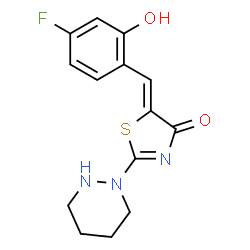CLP 257
Modify Date: 2025-08-25 11:26:49

CLP 257 structure
|
Common Name | CLP 257 | ||
|---|---|---|---|---|
| CAS Number | 1181081-71-9 | Molecular Weight | 307.343 | |
| Density | 1.5±0.1 g/cm3 | Boiling Point | 473.3±55.0 °C at 760 mmHg | |
| Molecular Formula | C14H14FN3O2S | Melting Point | N/A | |
| MSDS | Chinese USA | Flash Point | 240.0±31.5 °C | |
| Symbol |

GHS07 |
Signal Word | Warning | |
Use of CLP 257CLP257 (CLP-257) is a potent, selective K+-Cl- cotransporter KCC2 activator with EC50 of 616 nM; displays selectivity for KCC2 over other KCC family members, NKCC1 and GABAA receptors, and a panel of 55 other receptors; restores impaired Cl(-) transport in neurons, rescues KCC2 plasma membrane expression; renormalizes stimulus-evoked responses in spinal nociceptive pathways in a rat model of neuropathic pain. |
| Name | CLP257 |
|---|---|
| Synonym | More Synonyms |
| Description | CLP257 (CLP-257) is a potent, selective K+-Cl- cotransporter KCC2 activator with EC50 of 616 nM; displays selectivity for KCC2 over other KCC family members, NKCC1 and GABAA receptors, and a panel of 55 other receptors; restores impaired Cl(-) transport in neurons, rescues KCC2 plasma membrane expression; renormalizes stimulus-evoked responses in spinal nociceptive pathways in a rat model of neuropathic pain. |
|---|---|
| Related Catalog | |
| Target |
EC50: 616 nM (KCC2)[1] |
| In Vitro | There is no change in [Cl−]i in HEK293-cl cells when incubated with CLP257, indicating inactivity on NKCC1, KCC1, KCC3 or KCC4. Oocyte pre-incubation with CLP257 (200 nM) increases KCC2 transport activity by 61%, but causes no change in other CCCs. Functional, dose-dependent antagonism is also observed between CLP257 and the recently characterized KCC2 antagonist VU024055119. CLP257 (50 μM) provokes < 0.2% of the effect of 5 μM muscimol in CHO cells transduced with recombinant α1β2γ2 GABAA receptors, indicating negligible agonist activity of CLP257 on GABAA receptors[1]. |
| In Vivo | CLP257 (100 mg/kg; intraperitoneal injection; adult male rats) treatment induced a significant increase in mechanical sensitivity[2]. Animal Model: Adult male rats (300 g) injected with Morphine[2] Dosage: 100 mg/kg Administration: Intraperitoneal injection Result: Induced a significant increase in mechanical sensitivity. |
| References |
| Density | 1.5±0.1 g/cm3 |
|---|---|
| Boiling Point | 473.3±55.0 °C at 760 mmHg |
| Molecular Formula | C14H14FN3O2S |
| Molecular Weight | 307.343 |
| Flash Point | 240.0±31.5 °C |
| Exact Mass | 307.079071 |
| LogP | 2.67 |
| Vapour Pressure | 0.0±1.2 mmHg at 25°C |
| Index of Refraction | 1.697 |
| Storage condition | 2-8°C |
| Symbol |

GHS07 |
|---|---|
| Signal Word | Warning |
| Hazard Statements | H302 |
| Precautionary Statements | P301 + P312 + P330 |
| Hazard Codes | Xi |
| RIDADR | NONH for all modes of transport |
| (5Z)-5-[(4-Fluoro-2-hydroxyphenyl)methylene]-2-(tetrahydro-1-(2H)-pyridazinyl)-4(5H)-thiazolone |
| (5Z)-5-(4-Fluoro-2-hydroxybenzylidene)-2-(tetrahydro-1(2H)-pyridazinyl)-1,3-thiazol-4(5H)-one |
| CLP257 |
| MFCD28166488 |
| 4(5H)-Thiazolone, 5-[(4-fluoro-2-hydroxyphenyl)methylene]-2-(tetrahydro-1(2H)-pyridazinyl)-, (5Z)- |